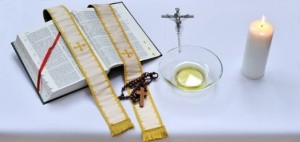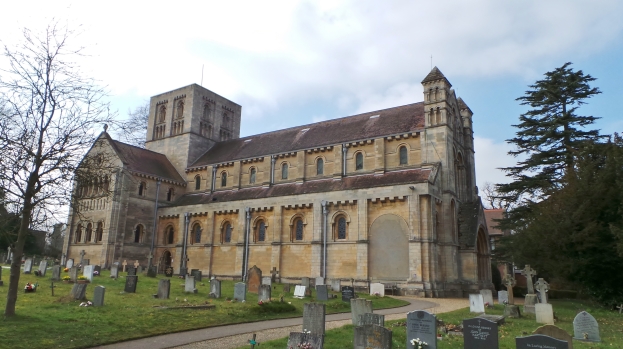Introduction
 The Sacraments are the building blocks of our life within the Catholic Church and for the world in which we live. Whatever our personal experiences, we seek to express our faith as Catholic Christians in communion with the Church and with as many as possible of those who share our Christian faith.
The Sacraments are the building blocks of our life within the Catholic Church and for the world in which we live. Whatever our personal experiences, we seek to express our faith as Catholic Christians in communion with the Church and with as many as possible of those who share our Christian faith.
A few of the details given below – such as the (non-sacramental!) churchyard regulations which conclude this section on Catholic Life – will be specific to our parish; but most of the following ‘simple guide’ will be relevant to Catholics everywhere.
The Sacraments of Initiation
It is perhaps simplest to think of these three Sacraments as being age related:
- Birth to age seven; Baptism;
- Age seven to thirteen; Baptism and Communion;
- Age thirteen to adult; Baptism, Communion and Confirmation.
Normally, a child would receive these Sacraments consecutively, while an adult convert could receive all three Sacraments of Initiation at one ceremony.
Baptism
 As the first sacrament, Baptism is one of the clearest signs of the presence of God in human life and a baptised child is supported by a loving family who profess their Faith.
As the first sacrament, Baptism is one of the clearest signs of the presence of God in human life and a baptised child is supported by a loving family who profess their Faith.
In addition, church law requires there be at least one Godparent who must be a practising Catholic. Any other Godparent must be baptised but not necessarily a Catholic.
Adults and children over seven, make personal Baptismal promises, demonstrating a conscious choice and a commitment to the practice of the Faith.
Eucharist – Holy Communion
 The word ‘Eucharist’ evokes thanksgiving for God’s gift of Grace, exemplified in the Consecration which is at the heart of the Mass. Communion is then available to those who are part of the church family and aged from seven upwards.
The word ‘Eucharist’ evokes thanksgiving for God’s gift of Grace, exemplified in the Consecration which is at the heart of the Mass. Communion is then available to those who are part of the church family and aged from seven upwards.
To prepare children for the reception of Communion, a First Holy Communion course is held each winter. First Holy Communion is distributed at a special Sunday Mass, usually in May or June.
Note that it is still a requirement to fast for one hour before taking Holy Communion.
Confirmation
 Those who are baptised as infants can celebrate the beginning of their Christian adulthood with the Sacrament of Confirmation at the age of 13 or over.
Those who are baptised as infants can celebrate the beginning of their Christian adulthood with the Sacrament of Confirmation at the age of 13 or over.
There is normally a parish programme every third year, for any teenager who would like to be confirmed in the faith, and we are visited by our Bishop who celebrates this sacrament with us.
Rite of Christian Initiation of Adults (RCIA)
 For adult converts, the three Sacraments of Initiation are generally celebrated together. This usually occurs at Easter time when, following their programme of preparation, they are received into the Church.
For adult converts, the three Sacraments of Initiation are generally celebrated together. This usually occurs at Easter time when, following their programme of preparation, they are received into the Church.
The length of time required for the programme depends upon the individual. Six months is a reasonable minimum period, but it may be much longer, as it truly relates to the experience of a lifetime.
The Sacrament of Reconciliation – Confession
 The change of name has put the emphasis of this Sacrament on healing the rift between man and God caused by sin and to restore us to a state of grace and communion with God.
The change of name has put the emphasis of this Sacrament on healing the rift between man and God caused by sin and to restore us to a state of grace and communion with God.
In St Benet’s, it is routinely available after Mass on Saturday or by appointment with the Priest. Additional arrangements are made at Lent and Advent.
Note that it is still a requirement to “receive the Sacrament of Reconciliation at least once per year, at Easter or thereabouts”.
Marriage
 The Sacrament of Marriage recognises and sanctifies the serious commitment of a man and a woman deciding to join together for the rest of their lives and to bring up their children in the Catholic faith.
The Sacrament of Marriage recognises and sanctifies the serious commitment of a man and a woman deciding to join together for the rest of their lives and to bring up their children in the Catholic faith.
The seriousness of this commitment is recognised by the Church’s requirement that at least six months’ notice be given to the Priest of the intention to marry. This allows for a period of thoughtful preparation to be undertaken before the ceremony takes place.
At St Benet’s, wedding dates for the summer need to be booked more than twelve months in advance. While the Priest usually has overall responsibility for the ceremony, a Deacon administers matters relating to the civil registry as well as some other aspects of Marriage Preparation.
The Sacrament of the Sick
 Involving special prayers and anointing, this Sacrament has often been thought of as “Last Rites” to be administered just before death.
Involving special prayers and anointing, this Sacrament has often been thought of as “Last Rites” to be administered just before death.
While that may still happen, it can also be a source of peace to those suffering a serious illness – whether it is terminal or not – and can help the patient to cope with pain and debility. It can also be a source of spiritual relief for the family, giving the opportunity to pray together, with and for their loved one.
In less serious cases, a visit by a Priest, Deacon or parishioner can also give relief and hope – particularly if it is possible for Holy Communion to be administered to a sick or house-bound parishioner.
Funeral and Burial
 Strictly speaking, a funeral is not a sacramental celebration unless Mass is included. A burial has a sacramental aspect in the Minister’s use of the water of Baptism.
Strictly speaking, a funeral is not a sacramental celebration unless Mass is included. A burial has a sacramental aspect in the Minister’s use of the water of Baptism.
After any death, there will be many administrative details to be clarified and the Funeral Director will organise and liaise with the family on these.
If the Parish Priest is not already involved with the spiritual care of the deceased, the next-of-kin should make contact as soon as possible to discuss any Mass, Funeral, or other Service of Remembrance, related to the interment or cremation.
 St Benet’s Church grounds contain a consecrated graveyard but the few remaining full-size plots are all reserved and many interments now take place in the Beccles Cemetery.
St Benet’s Church grounds contain a consecrated graveyard but the few remaining full-size plots are all reserved and many interments now take place in the Beccles Cemetery.
If cremation is chosen, there is some space available near the Church for the burial of ashes.
The Parish Priest should be approached if you have any query about a funeral or interment.
